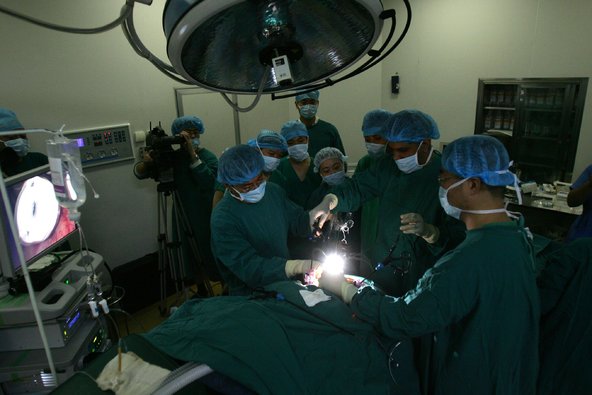
‘‘Once organs from willing death-row prisoners are included in our national distribution system, they will be considered voluntary citizen donations, and the expression ‘death-row donations’ won’t exist any more.’’
That statement, reported by The Beijing Times last year, by Huang Jiefu, a former deputy minister of health and China’s leading organ transplant official, makes clear why some doctors overseas are troubled by China’s recent push to overhaul its transplant system, which has long relied on harvesting organs from death-row prisoners.
If a prisoner is relabeled as a citizen who may legally donate, then prisoner organs may vanish from the record while remaining in circulation, violating the ethical standards of the World Medical Association, they say. The association (to which the China Medical Association belongs) opposes the use of prisoner organs on the grounds that a prisoner cannot give free consent.
So despite an announcement by Mr. Huang last December that China would stop using prisoners’ organs starting on Jan. 1, some medical organizations are raising alarms.
‘‘We must not be naïve,’’ Dr. Otmar Kloiber, the association’s secretary general, said in an interview.
‘‘And that must also be said to The Transplantation Society and the others,’’ said Dr. Kloiber, referring to the leading transplant organization and doctors whom the association represents. ‘‘They really have to ask for assurances that there are no organs used from executed prisoners anymore.’’
China is trying to change its organ transplant system to bring it more in line with international standards.
Yet with prisoners reclassified as citizens, the harvesting might never end, said Dr. Torsten Trey, executive director of Doctors Against Forced Organ Harvesting, an advocacy group based in Washington, in an email. It has simply become more hidden, he said.
‘‘Some sourcing pathways are altered,’’ Dr. Trey said. ‘‘Some previous channels are closed. Others are kept open.’’
Since ‘‘prisoners are under the control of the state, in contrast to free citizens who might enter an organ donation contract on the black market, we have to assume that — at least partially — policy makers, police, prison guards and military personnel are aware and backing the practice,’’ he said.
In China, Dr. Chen Jingyu, a lung transplant specialist at the Wuxi People’s Hospital, sees things differently.
A drop-off in donations that doctors feared after the announcement of a ban on the use of prisoner organs did not materialize. And while some may wonder whether that was because prisoner organs, now relabeled, are still being supplied, Dr. Chen said it was because of a surge in voluntary donations as citizens realized the old ways were coming to an end.
‘‘After we stopped using organs from death-row prisoners, in reality the number of organ transplants didn’t drop, but increased,’’ Dr. Chen said in an interview. ‘‘Getting rid of organ harvesting from prisoners forced us as a country — the hospitals, doctors, liaison people — to work really hard to promote organ donation.’’
Dr. Chen did not rule out prisoner organs among the donations but said any would have been legally acquired.
‘‘There may be a very few cases of death-row prisoners who are willing donors,’’ he said. ‘‘It is being done in a very orderly way, with witnesses. They must be truly willing and sign their agreement.’’
Figures appear to back Dr. Chen’s assertions that donations are growing.
In 2014, about 1,700 people donated about 5,000 organs, Dr. Huang said. But in just the first two months of this year, 381 people donated 937 organs, he told The Beijing Morning News. That could translate to more than 2,300 donations this year. The figure did not include organs from living donors to family members.
‘‘A great climate for voluntary citizen organ donation is taking shape in China,’’ Dr. Huang told the newspaper.
Follow Didi Kirsten Tatlow on Twitter @dktatlow.
